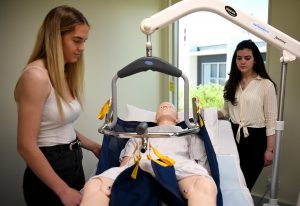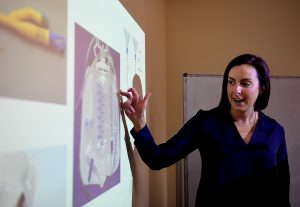NDIS/Aged Care Health Specific Workshops
CATHETER MANAGEMENT
This session aims to provide support workers the necessary knowledge to effectively care for a client with either an indwelling or a suprapubic catheter
- An overview of the urinary system
- An introduction to terminology associated with urinary elimination
- An understanding of the principles of managing an indwelling catheter and a suprapubic catheter
- Leg bag and night bag attachment and management
- What to do if there is no urine flow and how to manage a blocked catheter.
Duration: 3 hours
Cost: Contact us on info@questsolutions.com.au
DIABETES MANAGEMENT
This session is to give care staff an overview of the types and symptoms of diabetes, insulin administration via pen device and management of hypo and hyperglycaemia as well as diabetic emergencies. The following will be discussed, and participants will be given the opportunity to practice on using a glucometer, insulin pens and the byetta:
- The role of insulin
- The different types of diabetes
- Blood glucose monitoring and its significance
- Main types of insulin and factors that influence insulin absorption
- Byetta (exenatide) injection for type 2 diabetes
- Management of Hypoglycaemia, Hyperglycaemia and Diabetic emergency.
- Reporting and documentation requirements
Duration: 3 hours
Cost: Contact us on info@questsolutions.com.au
HEALTHY BOWEL MANAGEMENT
This workshop aims to provide participants with the relevant knowledge in assisting clients maintain a healthy bowel through effective evidence-based management. The following will be discussed, and participants will be given the opportunity to practice on necessary skills that promote faecal elimination:
- Factors that influence faecal elimination and patterns of defecation (including medications, importance of diet, fluids and exercise in bowel management)
- Distinguish normal from abnormal characteristics of faeces
- Specific common faecal elimination problems
- Identify measures that promote normal elimination patterns (including abdominal massage, digital rectal stimulation, rectal irrigation systems, & medications)
- Autonomic dysreflexia and emergency management
- Reporting and documentation requirements
Duration: 3 hours
Cost: Contact us on info@questsolutions.com.au
PEG (PERCUTANEOUS ENDOSCOPIC GASTRONOMY) TRAINING
This session is to give care staff an overview of how to competently care for clients with percutaneous endoscopic gastrostomy (PEG) and other enteral nutritional support (e.g. Nasogastric, Jejunostomy) The following will be discussed to the students with relevant skills demonstrated accordingly where students will be given the opportunity to practice:
- An introduction to enteral tube feeding
- Knowledge of some of the common indications for PEG feeding and assessment findings for referrals
- Types of supplements available
- Types of tubes (ie. nasogastric tube, PEG tube)
- Common problems encountered with enteral tube feeding
- Guidelines in giving medications (as per organisational protocol where staff must have the relevant qualification in assisting clients with medication)
- Describe the various delivery systems for PEG feeding (bolus, pump and gravity)
- Using a Kangaroo pump machine
- Using a Flocare infinity machine
- Important knowledge of PEG feed administration, including reporting and documentation requirements
- Knowledge of some of the common complications of PEG feeding
- Storage of formula and aftercare
Duration: 3 hours
Cost: Contact us on info@questsolutions.com.au
MANUAL HANDLING TRAINING
This workshop aims to provide participants with an understanding of the requirements for safe manual handling as per WHS Act 2011 and WHS Regulation of 2011. The following will be discussed and demonstrated to the students:
- TILE (Task, Individual, Load and Environment)
- Safe balance circle
- Correct feet positioning and safe movement that is smooth and efficient, coordinated with the spine not twisted, counterbalanced.
- Hazardous manual tasks
- Rolling the client in bed
- Moving the client in bed using slide sheets
- Assisting the client with sit to stand transfer using the pelican belt from bed to chair and or wheelchair to bed
- Use of mechanical aids (stand lifter and sling lifter)
- Falls recovery
- Car transfers (in and out of the car)
- Dismantling and assembling a wheelchair
*The students will need to carry out a return demonstration of the above-mentioned tasks at class to be deemed competent.
Duration: 3 hours
Cost: Contact us on info@questsolutions.com.au
MEDICATION ASSISTANCE
This session describes the skills and knowledge required to prepare for and provide medication assistance, and complete medication documentation. It also involves supporting a client to self-administer medication. The following will be discussed and students will be given the opportunity to practice in a simulated environment:
- Prepare to assist with medication
- Prepare the client for assistance with medication
- Support clients with medication
- Understand the different forms of medication, and how they are handled, administered and stored, including:
- Capsules
- Drops
- Inhalants
- Liquids
- Lotions and creams
- Ointments
- Patches
- Powders
- Tablets
- Wafers
- Pessary
- Suppository
- Understand potential impacts of errors and reasons for error in medication charts, their role and procedures for use and how to handle medication contingencies
- Complete medication distribution and documentation
Duration: 6 hours
Cost: Contact us on info@questsolutions.com.au
OSTOMY (STOMA) MANAGEMENT
This session is to enable support workers to competently care for clients with a variety of stomas
- An overview of the GI system and describe appropriate terminology in relation to ostomies
- Identify & discuss common causes for stoma formation
- Describe the management of a stoma
- Competently apply a variety of stoma appliances
- Discuss diet and hydration requirements of an ostomate
- Discuss common psychosocial issues faced by ostomates, and incorporate relevant strategies to address these needs into care planning
Duration: 3 hours
Cost: Contact us on info@questsolutions.com.au
EPILEPSY WORKSHOP
This session is to give care staff an overview of how to competently care for clients with Epilepsy, use of oxygen and administering Midazolam.
The following will be discussed to the students with relevant skills demonstrated accordingly where students will be given the opportunity to practice:
-
- An introduction to Epilepsy – definition, common medical terminologies support workers will encounter. Simplified anatomy of the brain is entailed to assist in better understanding.
- Support worker’s roles and functions in a seizure episode (Seizure first aid)
- Identify when to seek further assistance.
- Medication management – Midazolam
- When and how to administer oxygen therapy
- Falls management from a seizure episode.
- Manual handling for falls management.
- Other considerations for epilepsy management
Duration: 3 hours
Cost: Contact us on info@questsolutions.com.au
DYSPHAGIA WORKSHOP
This session is to give care staff an overview of how to competently care for clients with Dysphagia,
The following will be discussed to the students with relevant skills demonstrated accordingly where students will be given the opportunity to practice:
- An introduction to Dysphagia
- Symptoms and causes of Dysphagia
- IDDSI diet
- Safe meal assistance
- Choking – signs and symptoms
- Prevention of choking
- Emergency management of choking
- Choking and CPR
- Practical demonstration of choking algorithm on CPR manikins
Duration: 3 hours
Cost: Contact us on info@questsolutions.com.au




